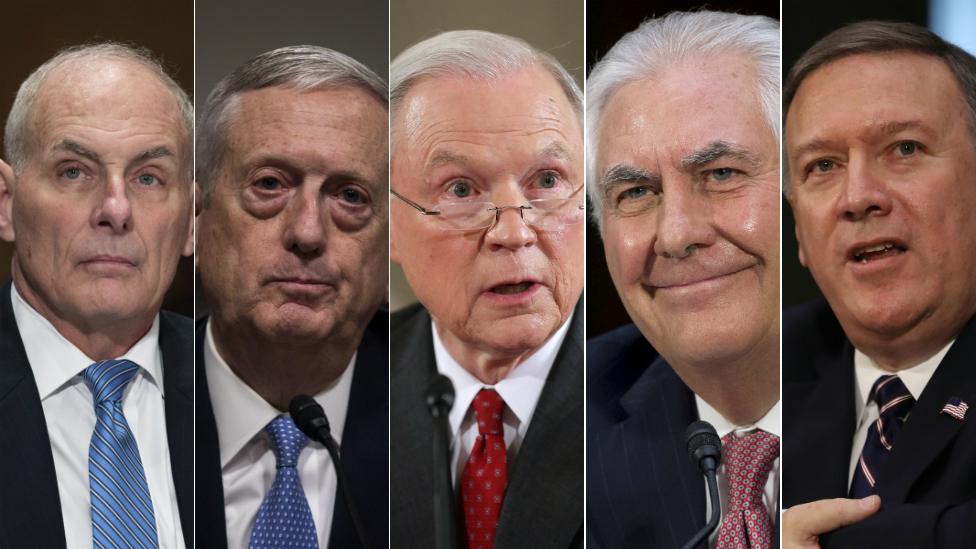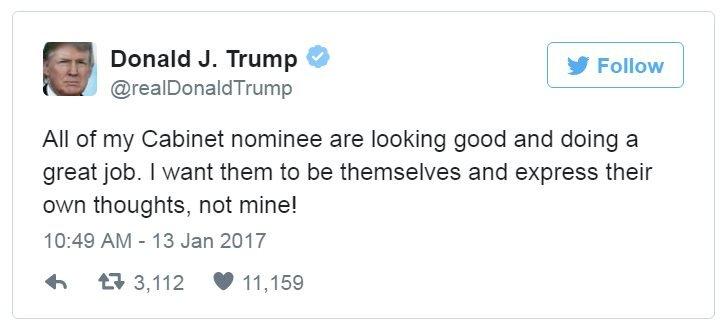Trump's cabinet nominees contradict him on key issues
- Published

From L-R: John Kelly, James Mattis, Jeff Sessions, Rex Tillerson, Mike Pompeo
The first round of confirmation hearings for Donald Trump's cabinet saw his nominees contradict him numerous times on key issues.
The cabinet hopefuls diverged from the president-elect's positions on the Iran deal, Nato, the Mexico border wall and more, revealing major policy disagreements.
Mr Trump has gained a reputation for ideological flexibility, and the hearings suggest he may need to revise several campaign pledges in order to avoid clashes with his senior staff.
Here are the key disagreements.
On Muslims
What Trump said
"Donald J Trump is calling for a total and complete shutdown of Muslims entering the United States until our country's representatives can figure out what is going on."
Asked if he supported a compulsory database of US Muslims, Mr Trump said: "I would certainly implement that", adding that authorities could go to Mosques "and different places" to "sign them up".
He has added various caveats at points, saying he could restrict the ban to "terrorist countries" and allow some Muslims to enter if they were subjected to "extreme vetting".
What the nominees said
Jeff Sessions, Mr Trump's pick for attorney general: "I do not support the idea that Muslims as a religious group should be denied entry to the United States."
"I would not favour a registry of Muslims in the United States, no I would not."
John Kelly, Mr Trump's pick for homeland security: "I don't think it's ever appropriate to focus on something like religion as the only factor."
On the wall
What Trump said
"Walls work."
What the nominees said
John Kelly: "A physical barrier in and of itself will not do the job."
On the Iran deal
What Trump said
The president-elect called the Iran nuclear deal "disastrous" and "the stupidest deal of all time", and said dismantling it was his "number one priority".
What the nominees said
James Mattis, Mr Trump's nominee for secretary of defence, told senators the deal was "imperfect" but said the US would honour it.
"When America gives its word we have to live up to it and work with our allies," he said.
Rex Tillerson, the nominee for secretary of state, called for a "full review" of the deal but declined to say it should be torn up.
On Russia and Vladimir Putin
What Trump said
Mr Trump has called the Russian president "highly respected" and a "great leader".
"I'm saying that I'd possibly have a good relationship. He's been very nice to me," he said.
Mr Trump publicly doubted US intelligence services when they said they believed with "high confidence" that Russia was behind the hacking of the Democratic Party.
On Thursday the president-elect conceded that Russia was "probably" behind the hacking, adding: "We also get hacked by other countries and other people."
What the nominees said
John Kelly told senators that he believed "with high confidence" the US intelligence findings on Russian hacking.
James Mattis called Russia an "adversary" and said he had "very modest expectations for areas of co-operation with Mr Putin".
Mike Pompeo, Mr Trump's pick for head of the CIA, said it was "pretty clear" that the Russians hacked the DNC, calling it "an aggressive action taken by senior leadership inside of Russia".
He said Russia had "reasserted itself aggressively" on the world stage, "invading and occupying Ukraine, threatening Europe, and doing nothing to aid in the destruction and defeat of ISIS".
On torture
What Trump said
"Torture works, OK folks? You know, I have these guys - 'Torture doesn't work!' - believe me, it works."
"I would bring back waterboarding, and I would bring back a hell of a lot worse than waterboarding."
Asked about former CIA Director Michael Hayden's assertion that the military could defy his orders: "They won't refuse. They're not going to refuse, believe me."
What the nominees said
Mike Pompeo, asked if he would comply with an order to use enhanced interrogation techniques: "Absolutely not."
On Nato
What Trump said
The president-elect caused alarm in July when he refused to confirm that the US would come to the aid of Nato allies in the event of an attack, despite a long-standing, treaty-bound obligation to do so.
Mr Trump accused other Nato countries of not paying enough to the US and said the US may only support them if they "fulfil their obligations to us".
What the nominees said
James Mattis, a former Nato military leader, called the organisation "the most successful military alliance probably in modern history, maybe ever" and accused Russia of trying to "break" it.
Rex Tillerson said that Nato's mutual defence pact - the one Mr Trump refused to say he would honour - was "inviolable".
On TPP
What Trump said
Mr Trump called the Trans-Pacific Partnership free-trade deal "a potential disaster for our country" which he would scrap on his "first day in office".
What the nominees said
Rex Tillerson: "I do not oppose TPP."
On disagreeing with your cabinet nominees
